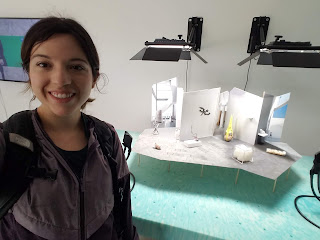Unit 7: Neuroscience + Art
The brain is arguably the most complex and mysterious aspect of the body. Despite the excessive amounts of scientific research performed on the brain and both its conscious and unconscious states, there is still so little that we know about it (Vesna, Lecture 2). This lack has attracted those with imagination, such as artists, to further explore and explain the brain. According to artists Giovanni Frazzetto and Suzanne Anker, the brain is described as follows: "Unlike other organs in the body, the brain is regarded as irreplaceable in its function to confer personhood. This feature of ‘being’, rather than ‘having’, a brain is what defines human beings as cerebral subjects." Surely, the brain has been attributed with defining the uniqueness of man.
 |
| Relationship between Science, Art, and the Media |
Unfortunately, this uniqueness is not always credited for the benefit of society. Carl Jung, the founder of analytical psychology, has explained a deeper, more spiritual aspect of the modern man, who realizes he himself is included in "the disappointment of the hopes and expectations of the ages. He has seen how beneficent are science, technology and organization but also how catastrophic they can be." Jung cannot ignore the failures of mankind if he were to properly be a "fully conscious" man, which brings the question: What is consciousness?
 |
| 3-Part Consciousness According to Sigmund Freud |
Franz Joseph Gall attempted to study consciousness by developing his theory of a brain divided as 27 separate organs and eventually phrenology, the idea that bumps on the head indicate the overuse of these organs (Vesna, Lecture 1). Edward Anthony Spitzka, an anatomist, rejected phrenology but admitted that it eventually morphed into the modern principles of cerebral localization (Today in Science History).
 |
| Phrenology |
Learning about the combination of neuroscience and art, I was surprised to see the amount of controversy existing between the two and the room for creativity for artists to explore. Pertaining to consciousness of the brain, I am in some agreement with Rene Descartes, who claimed man is "a soul and a body. First I must describe the body on its own; then the soul, again on its own; and finally I must show how these two natures would have to be joined and united in order to constitute men who resemble us" (Jones).
Sources
Earthpages.ca. “Phrenology – A Case of Science Overextending Itself.” Earthpages.ca, 18 Sept. 2017, earthpages.wordpress.com/2017/09/18/phrenology/.
“Explore 100 Famous Scientist Quotes Pages.” Prince Louis-Victor De Broglie Quotes - 7 Science Quotes - Dictionary of Science Quotations and Scientist Quotes, todayinsci.com/G/Gall_Franz/GallFranz-Quotations.htm.
Frazzetto, Giovanni, and Suzanne Anker. “Neuroculture.” Nature Reviews Neuroscience, vol. 10, no. 11, 2009, pp. 815–821.
Jones, Jonathan. “To Oblivion and beyond: Art and Science at the Edge of Consciousness.” The Guardian, Guardian News and Media, 3 Feb. 2016, www.theguardian.com/artanddesign/2016/feb/03/to-oblivion-and-beyond-art-and-science-at-the-edge-of-consciousness.
Jung, Carl Gustav. The Spiritual Problem of Modern Man. 1931.
“The Conscious, Subconscious, and Unconscious Mind - How Does It All Work?” Didacticism, 23 Feb. 2018, didacticism.com/the-conscious-subconscious-and-unconscious-mind-how-does-it-all-work/.
“The Spiritual Problem of Modern Man.” Akt's Space, 8 June 2010, ktapoon.wordpress.com/2010/06/08/the-spiritual-problem-of-modern-man/.
Vesna, Victoria. “Neuroscience + Art.” Lecture 1. <https://cole2.uconline.edu/courses/888567/pages/unit-7-view?module_item_id=16300821>.
Vesna, Victoria. “Neuroscience + Art.” Lecture 2. <https://cole2.uconline.edu/courses/888567/pages/unit-7-view?module_item_id=16300821>.


I think it is interesting that you distinguished the idea of "being" from "having" a brain for it is the crucial difference between us humans and animals. Animals do have brains but, according to the lectures, they have 8 less functions than ours. Humans have the sense of "construction, feelings, moral sense, etc." that allow us to process information and respond in a civilized and controlled way rather than in animalistic and basic instinct.
ReplyDelete